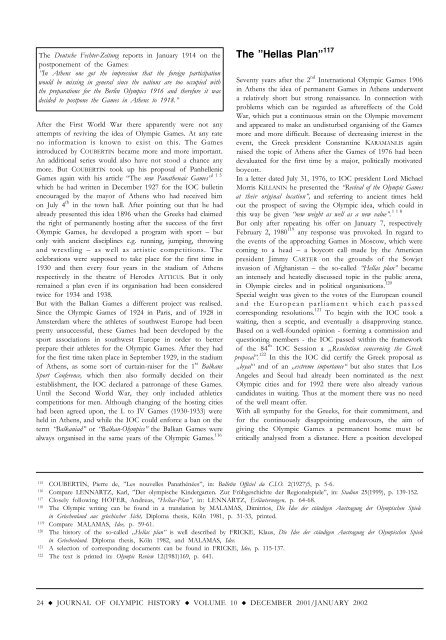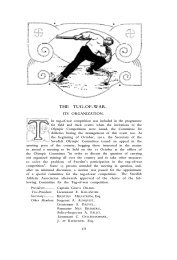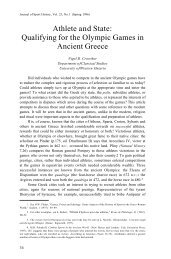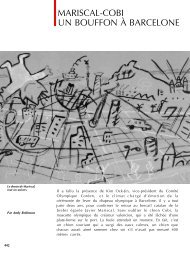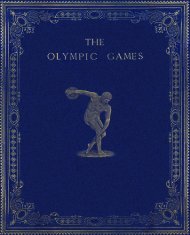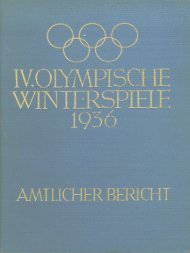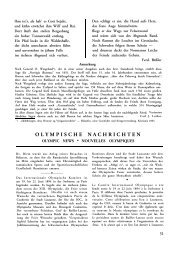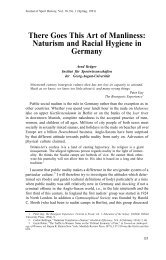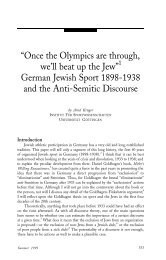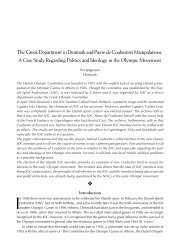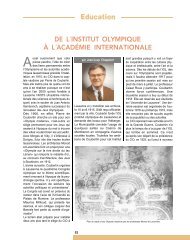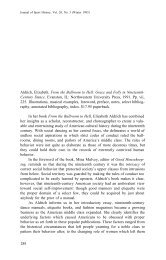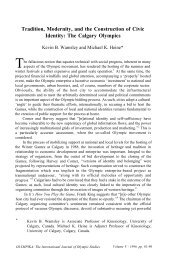The 2nd International Olympic Games in Athens 1906.
The 2nd International Olympic Games in Athens 1906.
The 2nd International Olympic Games in Athens 1906.
Create successful ePaper yourself
Turn your PDF publications into a flip-book with our unique Google optimized e-Paper software.
<strong>The</strong> Deutsche Fechter-Zeitung reports <strong>in</strong> January 1914 on the<br />
postponement of the <strong>Games</strong>:<br />
”In <strong>Athens</strong> one got the impression that the foreign participation<br />
would be miss<strong>in</strong>g <strong>in</strong> general s<strong>in</strong>ce the nations are too occupied with<br />
the preparations for the Berl<strong>in</strong> <strong>Olympic</strong>s 1916 and therefore it was<br />
decided to postpone the <strong>Games</strong> <strong>in</strong> <strong>Athens</strong> to 1918.”<br />
After the First World War there apparently were not any<br />
attempts of reviv<strong>in</strong>g the idea of <strong>Olympic</strong> <strong>Games</strong>. At any rate<br />
no <strong>in</strong>formation is known to exist on this. <strong>The</strong> <strong>Games</strong><br />
<strong>in</strong>troduced by COUBERTIN became more and more important.<br />
An additional series would also have not stood a chance any<br />
more. But COUBERTIN took up his proposal of Panhellenic<br />
<strong>Games</strong> aga<strong>in</strong> with his article “<strong>The</strong> new Panathenaic <strong>Games</strong>” 115<br />
which he had written <strong>in</strong> December 1927 for the IOC bullet<strong>in</strong><br />
encouraged by the mayor of <strong>Athens</strong> who had received him<br />
on July 4 th <strong>in</strong> the town hall. After po<strong>in</strong>t<strong>in</strong>g out that he had<br />
already presented this idea 1896 when the Greeks had claimed<br />
the right of permanently host<strong>in</strong>g after the success of the first<br />
<strong>Olympic</strong> <strong>Games</strong>, he developed a program with sport – but<br />
only with ancient discipl<strong>in</strong>es e.g. runn<strong>in</strong>g, jump<strong>in</strong>g, throw<strong>in</strong>g<br />
and wrestl<strong>in</strong>g – as well as artistic competitions. <strong>The</strong><br />
celebrations were supposed to take place for the first time <strong>in</strong><br />
1930 and then every four years <strong>in</strong> the stadium of <strong>Athens</strong><br />
respectively <strong>in</strong> the theatre of Herodes ATTICUS. But it only<br />
rema<strong>in</strong>ed a plan even if its organisation had been considered<br />
twice for 1934 and 1938.<br />
But with the Balkan <strong>Games</strong> a different project was realised.<br />
S<strong>in</strong>ce the <strong>Olympic</strong> <strong>Games</strong> of 1924 <strong>in</strong> Paris, and of 1928 <strong>in</strong><br />
Amsterdam where the athletes of southwest Europe had been<br />
pretty unsuccessful, these <strong>Games</strong> had been developed by the<br />
sport associations <strong>in</strong> southwest Europe <strong>in</strong> order to better<br />
prepare their athletes for the <strong>Olympic</strong> <strong>Games</strong>. After they had<br />
for the first time taken place <strong>in</strong> September 1929, <strong>in</strong> the stadium<br />
of <strong>Athens</strong>, as some sort of curta<strong>in</strong>-raiser for the 1 st Balkans<br />
Sport Conference, which then also formally decided on their<br />
establishment, the IOC declared a patronage of these <strong>Games</strong>.<br />
Until the Second World War, they only <strong>in</strong>cluded athletics<br />
competitions for men. Although chang<strong>in</strong>g of the host<strong>in</strong>g cities<br />
had been agreed upon, the I. to IV <strong>Games</strong> (1930-1933) were<br />
held <strong>in</strong> <strong>Athens</strong>, and while the IOC could enforce a ban on the<br />
term “Balkaniad” or “Balkan-<strong>Olympic</strong>s” the Balkan <strong>Games</strong> were<br />
Seventy years after the 2 nd <strong>International</strong> <strong>Olympic</strong> <strong>Games</strong> 1906<br />
<strong>in</strong> <strong>Athens</strong> the idea of permanent <strong>Games</strong> <strong>in</strong> <strong>Athens</strong> underwent<br />
a relatively short but strong renaissance. In connection with<br />
problems which can be regarded as aftereffects of the Cold<br />
War, which put a cont<strong>in</strong>uous stra<strong>in</strong> on the <strong>Olympic</strong> movement<br />
and appeared to make an undisturbed organis<strong>in</strong>g of the <strong>Games</strong><br />
more and more difficult. Because of decreas<strong>in</strong>g <strong>in</strong>terest <strong>in</strong> the<br />
event, the Greek president Constant<strong>in</strong>e KARAMANLIS aga<strong>in</strong><br />
raised the topic of <strong>Athens</strong> after the <strong>Games</strong> of 1976 had been<br />
devaluated for the first time by a major, politically motivated<br />
boycott.<br />
In a letter dated July 31, 1976, to IOC president Lord Michael<br />
Morris KILLANIN he presented the “Revival of the <strong>Olympic</strong> <strong>Games</strong><br />
at their orig<strong>in</strong>al location”, and referr<strong>in</strong>g to ancient times held<br />
out the prospect of sav<strong>in</strong>g the <strong>Olympic</strong> idea, which could <strong>in</strong><br />
this way be given “new weight as well as a new value”. 118<br />
But only after repeat<strong>in</strong>g his offer on January 7, respectively<br />
February 2, 1980 119 any response was provoked. In regard to<br />
the events of the approach<strong>in</strong>g <strong>Games</strong> <strong>in</strong> Moscow, which were<br />
com<strong>in</strong>g to a head – a boycott call made by the American<br />
president Jimmy CARTER on the grounds of the Sowjet<br />
<strong>in</strong>vasion of Afghanistan – the so-called “Hellas plan” became<br />
an <strong>in</strong>tensely and heatedly discussed topic <strong>in</strong> the public arena,<br />
<strong>in</strong> <strong>Olympic</strong> circles and <strong>in</strong> political organisations. 120<br />
Special weight was given to the votes of the European council<br />
and the European parliament which each passed<br />
<strong>The</strong> ”Hellas Plan” 117<br />
correspond<strong>in</strong>g resolutions. 121<br />
of the 84 th<br />
always organised <strong>in</strong> the same years of the <strong>Olympic</strong> <strong>Games</strong>. 116<br />
To beg<strong>in</strong> with the IOC took a<br />
wait<strong>in</strong>g, then a sceptic, and eventually a disapprov<strong>in</strong>g stance.<br />
Based on a well-founded op<strong>in</strong>ion - form<strong>in</strong>g a commission and<br />
question<strong>in</strong>g members - the IOC passed with<strong>in</strong> the framework<br />
IOC Session a ,,Resolution concern<strong>in</strong>g the Greek<br />
proposal”. 122 In this the IOC did certify the Greek proposal as<br />
,,loyal“ and of an ,,extreme importance“ but also states that Los<br />
Angeles and Seoul had already been nom<strong>in</strong>ated as the next<br />
<strong>Olympic</strong> cities and for 1992 there were also already various<br />
candidates <strong>in</strong> wait<strong>in</strong>g. Thus at the moment there was no need<br />
of the well meant offer.<br />
With all sympathy for the Greeks, for their commitment, and<br />
for the cont<strong>in</strong>uously disappo<strong>in</strong>t<strong>in</strong>g endeavours, the aim of<br />
giv<strong>in</strong>g the <strong>Olympic</strong> <strong>Games</strong> a permanent home must be<br />
critically analysed from a distance. Here a position developed<br />
115<br />
116<br />
117<br />
118<br />
119<br />
120<br />
121<br />
122<br />
COUBERTIN, Pierre de, ”Les nouvelles Panathénées”, <strong>in</strong>: Bullet<strong>in</strong> Officiel du C.I.O. 2(1927)5, p. 5-6.<br />
Compare LENNARTZ, Karl, ”Der olympische K<strong>in</strong>dergarten. Zur Frühgeschichte der Regionalspiele”, <strong>in</strong>: Stadion 25(1999), p. 139-152.<br />
Closely follow<strong>in</strong>g HÖFER, Andreas, ”Hellas-Plan”, <strong>in</strong>: LENNARTZ, Erläuterungen, p. 64-68.<br />
<strong>The</strong> <strong>Olympic</strong> writ<strong>in</strong>g can be found <strong>in</strong> a translation by MALAMAS, Dimitrios, Die Idee der ständigen Austragung der Olympischen Spiele<br />
<strong>in</strong> Griechenland aus griechischer Sicht, Diploma thesis, Köln 1981, p. 31-33, pr<strong>in</strong>ted.<br />
Compare MALAMAS, Idee, p. 59-61.<br />
<strong>The</strong> history of the so-called ,,Hellas plan” is well described by FRICKE, Klaus, Die Idee der ständigen Austragung der Olympischen Spiele<br />
<strong>in</strong> Griechenland. Diploma thesis, Köln 1982, and MALAMAS, Idee.<br />
A selection of correspond<strong>in</strong>g documents can be found <strong>in</strong> FRICKE, Idee, p. 115-137.<br />
<strong>The</strong> text is pr<strong>in</strong>ted <strong>in</strong>: <strong>Olympic</strong> Review 12(1981)169, p. 641.<br />
24 ◆ JOURNAL OF OLYMPIC HISTORY ◆ VOLUME 10 ◆ DECEMBER 2001/JANUARY 2002


